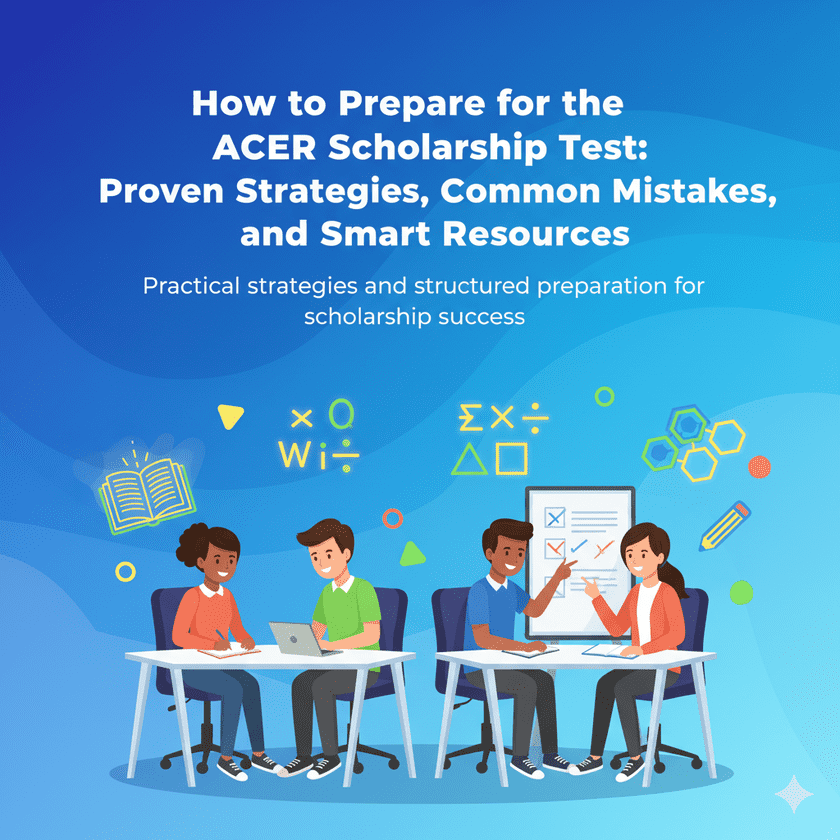Introduction
The ACER Scholarship Test is one of Australia’s most competitive academic assessments. Used by independent and private schools, the test helps identify high-achieving students for scholarships and selective entry programs. A strong result can unlock significant educational opportunities, such as partial or full fee scholarships and placements in accelerated academic pathways.
Unlike standard classroom tests, the ACER Scholarship Test focuses on higher-order thinking, problem-solving, and comprehension skills under time pressure.Preparing effectively requires more than last-minute cramming. It involves strategic skill development, familiarity with the test format, and consistent practice.
In this comprehensive guide, we’ll explore how the test works, key strategies for preparation, common mistakes to avoid, and how structured resources from NotesEdu can support students in building the right skills over time.
Understanding the ACER Scholarship Test
The ACER Scholarship Test is administered by the Australian Council for Educational Research (ACER).Hundreds of schools across Australia use it to identify academically able students for scholarships from Year 4 through to Year 12. The testis competitive: each year, thousands of students participate, but only a small percentage receive scholarship offers.
Purpose and Structure
According to ACER, the test is designed to identify students with exceptional academic potential by assessing a wide range of cognitive skills. Depending on the scholarship level (Primary or Secondary),the test may include sections such as:
- Reading (Humanities) Comprehension – Interpreting complex texts, identifying ideas, making inferences, and evaluating arguments.
- Mathematical Reasoning (Abstract) – Applying logical and quantitative reasoning to solve unfamiliar problems. Understanding information, recognising patterns, and demonstrating higher-order thinking
- Written Expression – Crafting structured, clear, and thoughtful written responses under time constraints.
The test format consists of multiple-choice and written-response questions, with strict time limits for each section. Questions are deliberately designed to challenge students with unfamiliar contexts and require flexible application of knowledge.
Strategic Preparation: Laying the Groundwork
Success in the ACER Scholarship Test isn’t about rote learning, but it’s about developing reasoning skills, improving comprehension, and learning to perform well under timed conditions.
Familiarise Yourself with the Test Format
A critical first step is to understand the structure and timing of the test. Familiarity reduces anxiety and improves pacing on the day. Students should review:
- Number of sections and their order
- Time limits for each section
- Types of questions and expected responses
Working with sample ACER-style questions helps students know what to expect. NotesEdu offers comprehensive preparation materials that closely mirror the structure of the actual exam, such as the ACER Scholarship Tests course, which includes realistic questions across various levels.
Develop a Consistent Study Plan
Creating a structured study plan several months of the test is far more effective than cramming. This plan should:
- Allocate time to each key skill area (reading, writing, maths, reasoning)
- Include regular practice sessions in short, focused blocks
- Build up to timed, full-length practice tests closer to the exam
Consistency builds confidence. Even two to three short sessions per week, overtime, can lead to significant skill improvement.
Building Core Skills for Success
Strengthening Reading Comprehension and Writing
Reading comprehension and written expression are critical components of the ACER Scholarship Test. Passages are often complex, with layered meanings that require inference and analysis. Likewise, writing tasks test clarity, structure, and the ability to express ideas under time pressure.
The ACER Reading and Writing Course by NotesEdu focuses on developing these skills through structured reading activities, writing prompts, and detailed feedback. Students practise responding to ACER-style passages and develop techniques for identifying key ideas, analysing arguments, and expressing opinions effectively.
Additionally, the ACER Scholarship Style Reading Tests provide timed practice that reflects the difficulty and complexity of the real test. These help students build reading stamina and improve speed without sacrificing comprehension.
Improving Mathematical and Abstract Reasoning
ACER mathematical reasoning questions often differ significantly from standard classroom tasks. Instead of memorising formulas, students must apply logical reasoning to solve unfamiliar problems. Abstract reasoning questions assess pattern recognition, problem-solving, and adaptability.
Structured practice is crucial here. The ACER Platinum Course and ACER Premium Primary Scholarship program offer extensive questions and mock tests tailored to different year levels. These courses help students develop problem-solving strategies, speed, and accuracy in a way that aligns closely with ACER’s testing approach.
Timed Practice and Performance Review
Simulating Real Test Conditions
The ACERScholarship Test is timed, and time pressure is a deliberate part of the challenge. Students should regularly practise in exam-like conditions, using full-length tests with timers to develop:
- Pacing strategies
- Stamina for longer reading passages
- Confidence under pressure
Practising under timed conditions also helps students understand how long they can realistically spend on each question before moving on to the next one.
Analysing Mistakes and Tracking Progress
Reviewing practice sessions is just as important as taking them. Students should examine:
- Which question types do they struggle with
- Whether errors are caused by misunderstanding, rushing, or knowledge gaps
- Patterns that indicate areas needing more focus
NotesEdu’s ACER Scholarship Tests include detailed solutions and performance analytics, allowing students to pinpoint weaknesses and track progress over time. This targeted review helps avoid repeating the same mistakes.
Managing Time and Reducing Anxiety
Pacing Strategies
Effective pacing is crucial. Students should:
- Start with questions they feel confident about to build momentum.
- Flag difficult questions and return to them later if time permits.
- Avoid spending too long on any single item.
This strategy helps maximise the number of questions answered correctly within the time limit.
Reducing Test Anxiety
Nerves are natural, but unmanaged anxiety can impact performance. Techniques such as deep breathing, visualisation, and positive self-talk can help.Building familiarity through regular mock tests can make the real exam feel less intimidating.
Beyond the Exam: Interview Preparation
Many scholarship programs involve an interview stage after the ACER test. This is where students can showcase their interests, motivation, and broader achievements.
The NotesEdu Interview Course provides structured guidance on common interview questions, communication techniques, and mock interviews. Preparing for this stage helps students present themselves confidently and articulate their strengths clearly.
Common Mistakes to Avoid
Even high-achieving students can make strategic errors during preparation or on the day of the test. Common pitfalls include:
- Procrastinating and leaving preparation too late
- Relying on rote learning instead of building reasoning skills
- Underestimating the difficulty of ACER-style questions
- Poor time management during practice and on test day
- Not reviewing errors to identify patterns
Avoiding these mistakes ensures that students make the most of their preparation time and approach the exam with confidence.
Bringing It All Together: A Smart PreparationStrategy
An effective preparation plan for the ACER Scholarship Test typically involves:
- Understanding the format through official and realistic practice questions
- Building core reading, writing, and reasoning skills through structured exercises
- Engaging in regular timed practice to build pacing and confidence
- Analysing performance to focus on targeted improvements
- Developing test-day strategies to manage time and reduce anxiety
Structured resources, like those offered through NotesEdu’s ACER preparation courses, can support each step of this process with carefully designed materials and analytics.
Conclusion
The ACERScholarship Test is a challenging but rewarding opportunity for students to showcase their academic potential. Success depends on building strong skills, understanding the format, and preparing strategically over time.
Families can choose a range of preparation approaches. Some prefer independent study, while others benefit from structured programs like NotesEdu’s, which provide realistic ACER-style questions, targeted skill-building courses, performance analytics, and interview preparation.
Starting early, staying consistent, and using reliable resources can give students the best chance to approach the ACER Scholarship Test with confidence and clarity.
Ready to give your child a structured, strategic advantage? Explore NotesEdu’s ACER preparation programs to access realistic tests, expert-designed courses, and targeted skill development to help them perform at their best.
Disclaimer
Preparation is not compulsory, and no preparation method can guarantee scholarship offers or specific outcomes. Success depends on each student’s individual abilities, effort, and performance on the day. NotesEdu is not affiliated with ACER.















